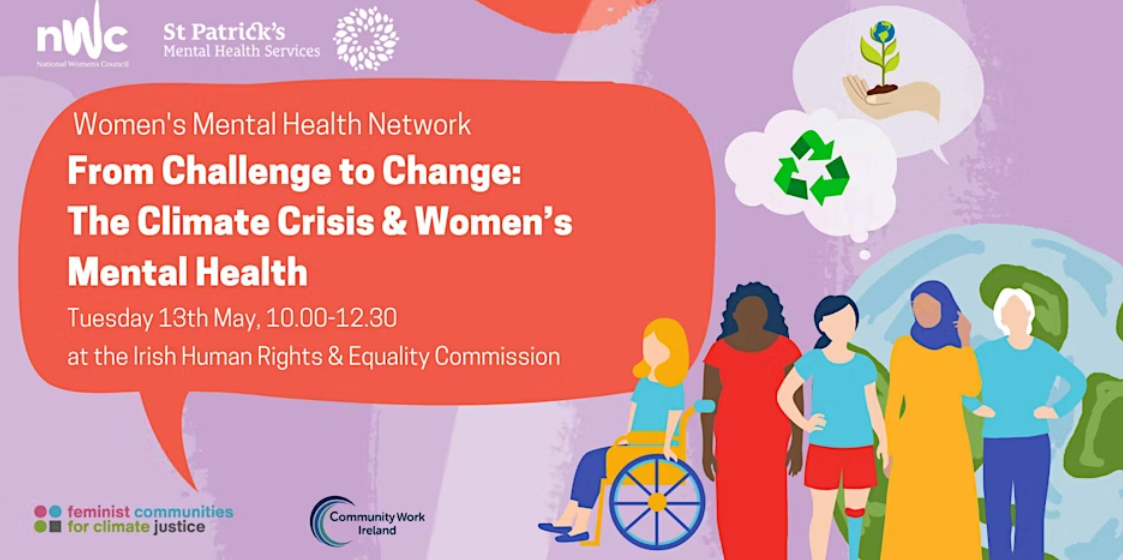
The latest event hosted by the Women’s Mental Health Network focused on the growing mental health impacts of climate change, with a particular emphasis on how these issues affect women.
The Women’s Mental Health Network is a collaboration between St Patrick’s Mental Health Services (SPMHS) and the National Women’s Council (NWC). The event took place on 15 May 2025 at the Irish Human Rights and Equality Commission.
Climate change and its growing mental health impacts
Speakers at the event emphasized that climate change is not only an environmental issue but also a growing mental health crisis. Extreme weather events like floods, which are becoming more frequent in Ireland, can have long-lasting mental health effects, leading to conditions such as PTSD, depression, anxiety, and grief.
The 2024 Lancet study on climate change and health in Europe highlighted that women, particularly pregnant women, and marginalized groups are disproportionately affected. It also revealed that heat-related deaths in Europe are twice as high in women as men, further demonstrating the gendered impacts of the climate crisis.
Youth facing rising anxiety due to climate crisis
The event also highlighted how climate change is affecting youth mental health, with studies showing rising levels of anxiety and depression among young people, who are increasingly concerned about their future. The Eco-UNESCO surveys revealed that the climate crisis is a significant source of stress, underscoring the urgent need for both climate action and mental health support for the younger generation.
The Feminist Communities for Climate Justice report
Vanessa Conroy, Project Officer with the Feminist Communities for Climate Justice (FCCJ), presented key findings from the FCCJ’s latest report, which points out that vulnerable groups; particularly women, older people, and low-income communities, will bear the brunt of climate-related health impacts. She stressed that the national mental health strategy and climate action plans must prioritize the well-being of these communities but expressed concern that there is still a lack of coordinated government action on this issue.
The need for open conversations and meaningful action
Louise O’Leary, Advocacy Manager here at SPMHS, highlighted the importance of having open conversations about climate change’s mental health effects.
“We are increasingly learning of the profound consequences of climate change for mental health across all ages and of its gendered impacts. But crucially we also know meaningful wide scale climate action, like ensuring clean air and access to all for safe walking, wheeling and cycling, will help protect mental health. Research indicates too that collective climate action can serve as an empowering way for people to respond to the rational feelings of distress, anxiety or overwhelm many of us have when considering the realities of the climate crisis.”
Expert speakers and interactive activities
The event featured a variety of speakers, including
- Dr Amy Brogan, Senior Clinical Psychologist and member of PSI SIG Climate
- Elena Manciu, Roma Climate Justice Peer Education Worker, Cairde
- Dr Liam MacGabhann, DCU Recovery College
- Dr Marica Cassarino, Environmental Psychologist, University College, and Secretary of Psychological Society of Ireland Special Interest Group (PSI SIG) Climate
- Louise O’Leary, Advocacy Manager, SPMHS
- Vanessa Conroy, Project Officer, FCCJ
The day also included interactive activities, such as a climate café for inclusive discussions on climate action and a sensory nature-based activity led by Dr Sinead O'Connor, Head of Social and Therapeutic Horticulture at Festina Lente Enterprises.
The Women’s Mental Health Network’s event underscores the urgent need for policymakers to integrate climate change and mental health strategies, focusing particularly on the unique challenges faced by women and marginalized communities. The call for action is clear: stronger, faster efforts are needed to protect both our environment and mental health.
Media queries
If you have press queries on the Women's Mental Health Network, please contact our Communications team below.


